外研版选修7Module4 Music born in America Grammar(共77张PPT)
文档属性
| 名称 | 外研版选修7Module4 Music born in America Grammar(共77张PPT) |

|
|
| 格式 | zip | ||
| 文件大小 | 6.2MB | ||
| 资源类型 | 教案 | ||
| 版本资源 | 外研版 | ||
| 科目 | 英语 | ||
| 更新时间 | 2015-03-19 00:00:00 | ||
图片预览



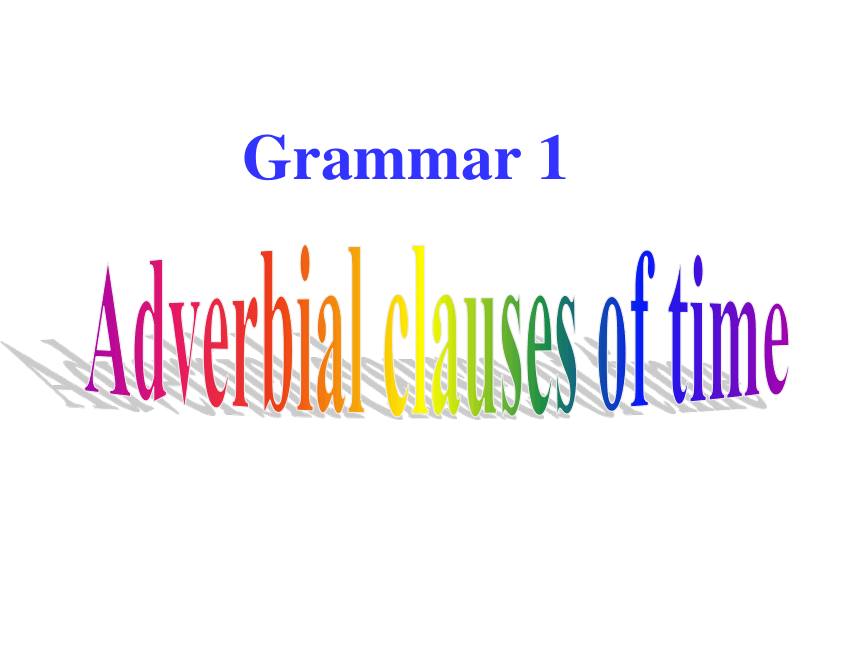
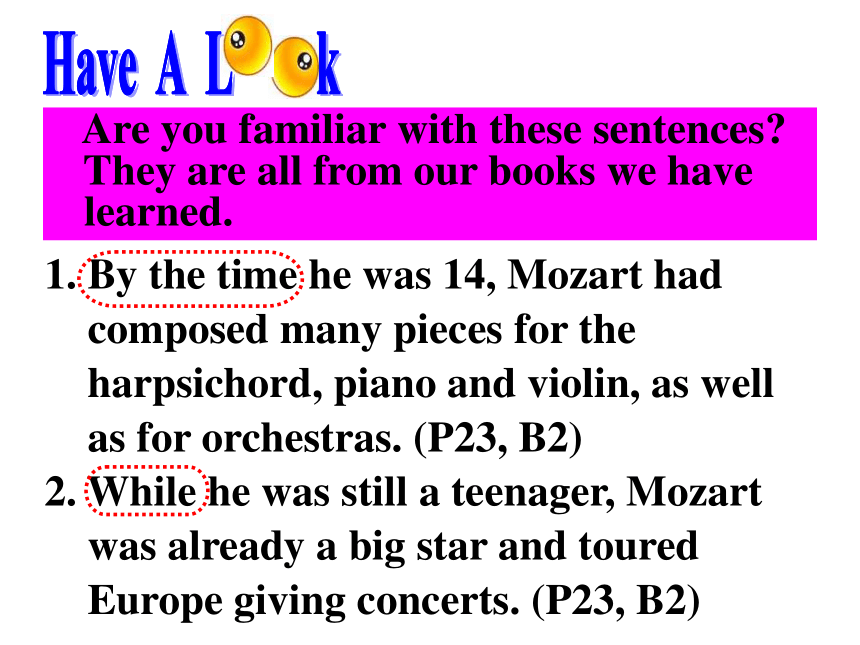

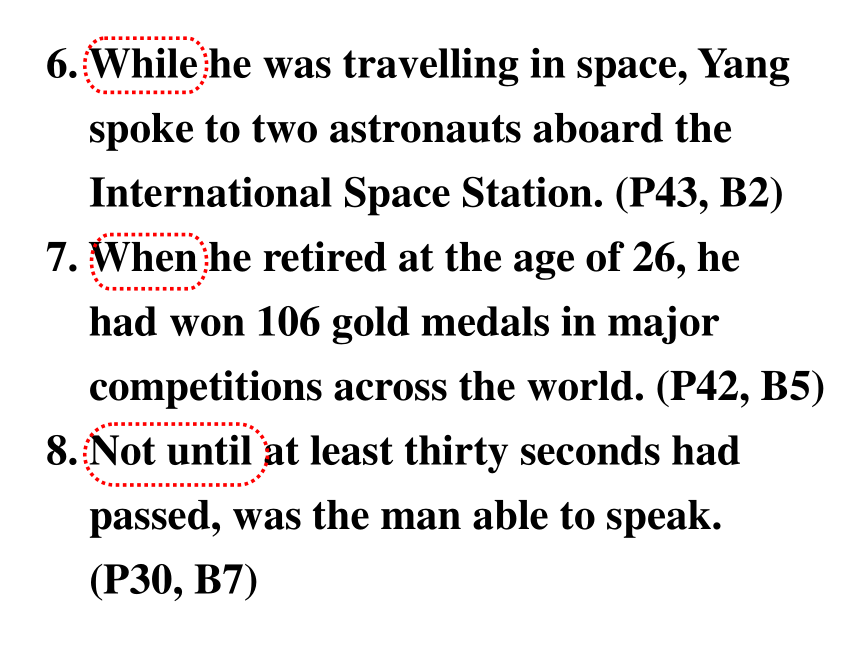
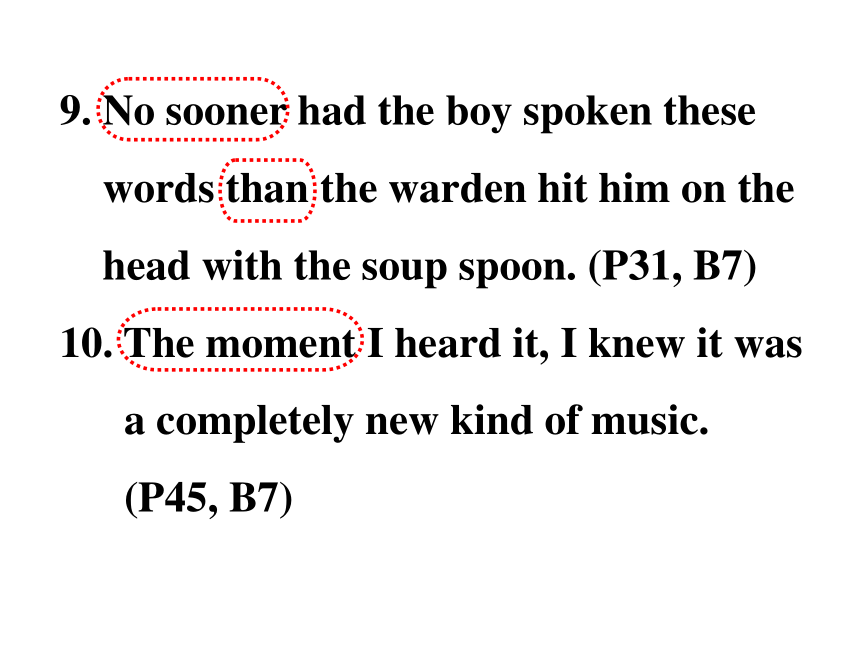
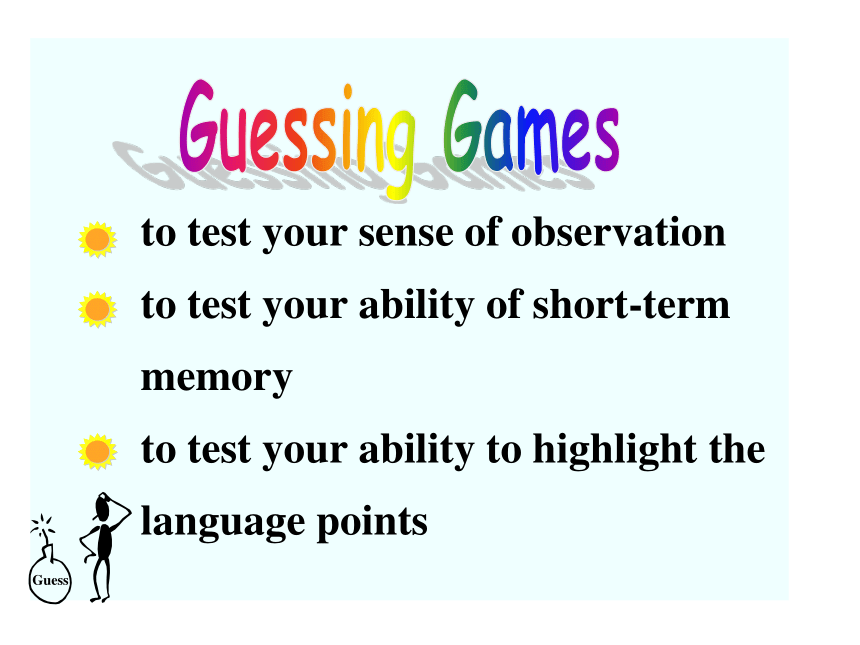
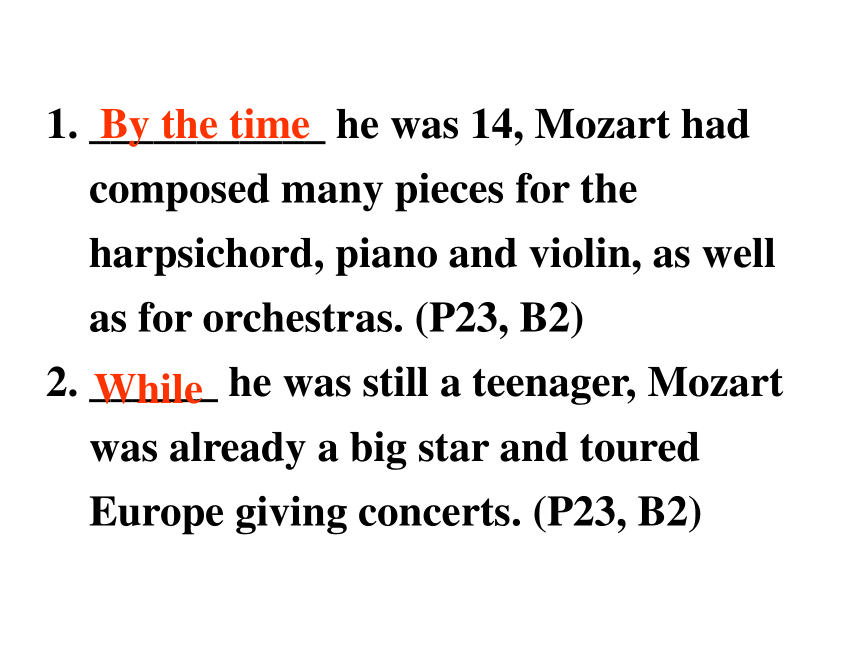

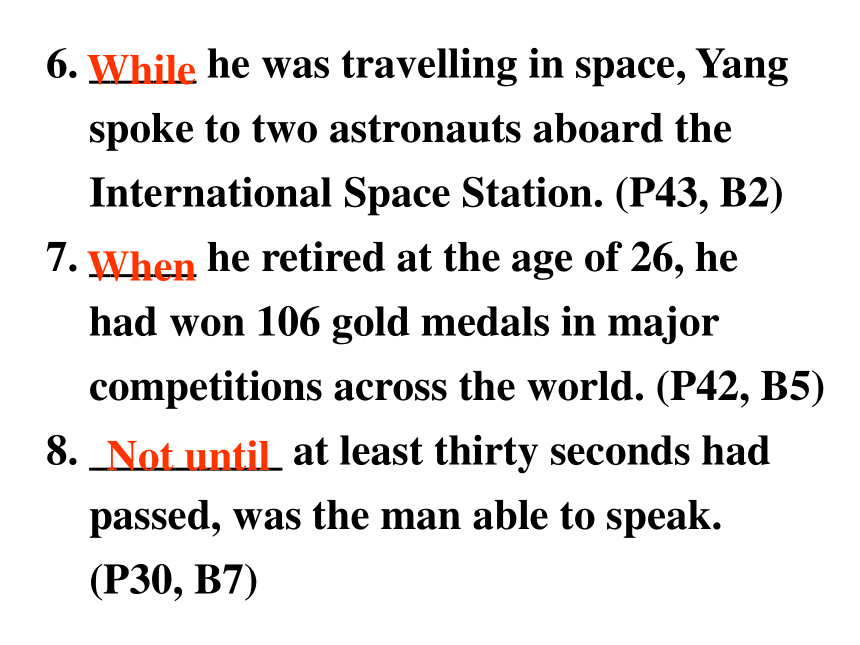
文档简介
课件77张PPT。 M4Music born in AmericaObjectivesTo learn about adverbial clauses
of time
2. To learn about ellipses语法讲解建议采用归纳法,如尽可能多的呈现一些相关例句,或可让学生从已学课文中找相应例句,引导学生试着从所观察到的语言现象中总结出语言规则和语法规律。Grammar 1Adverbial clauses of time By the time he was 14, Mozart had
composed many pieces for the
harpsichord, piano and violin, as well
as for orchestras. (P23, B2)
2. While he was still a teenager, Mozart
was already a big star and toured
Europe giving concerts. (P23, B2) Are you familiar with these sentences?
They are all from our books we have
learned. 3. Beethoven showed musical talent when
he was very young, and learned to play
the violin and piano from his father,
who was a singer. (P23, B2)
4. As he grew older, he began to go deaf.
(P23, B2)
5. When Yang took off from Jiuquan in
northwest China at 9 am yesterday,
China became the third nation to send a
man into space. (P43, B2)6. While he was travelling in space, Yang
spoke to two astronauts aboard the
International Space Station. (P43, B2)
7. When he retired at the age of 26, he
had won 106 gold medals in major
competitions across the world. (P42, B5)
8. Not until at least thirty seconds had
passed, was the man able to speak.
(P30, B7)9. No sooner had the boy spoken these
words than the warden hit him on the
head with the soup spoon. (P31, B7)
10. The moment I heard it, I knew it was
a completely new kind of music.
(P45, B7)to test your sense of observation
to test your ability of short-term memory
to test your ability to highlight the language pointsGuessGuessing Games ___________ he was 14, Mozart had
composed many pieces for the
harpsichord, piano and violin, as well
as for orchestras. (P23, B2)
2. ______ he was still a teenager, Mozart
was already a big star and toured
Europe giving concerts. (P23, B2)By the timeWhile3. Beethoven showed musical talent _____
he was very young, and learned to play
the violin and piano from his father,
who was a singer. (P23, B2)
4. ____ he grew older, he began to go deaf.
(P23, B2)
5. ______ Yang took off from Jiuquan in
northwest China at 9 am yesterday,
China became the third nation to send a
man into space. (P43, B2)whenAsWhen6. _____ he was travelling in space, Yang
spoke to two astronauts aboard the
International Space Station. (P43, B2)
7. _____ he retired at the age of 26, he
had won 106 gold medals in major
competitions across the world. (P42, B5)
8. _________ at least thirty seconds had
passed, was the man able to speak.
(P30, B7)WhileWhenNot until9. __________ had the boy spoken these
words than the warden hit him on the
head with the soup spoon. (P31, B7)
10. ___________ I heard it, I knew it was
a completely new kind of music.
(P45, B7)No soonerThe moment我一见到他就告诉他这个消息。(as soon as)
2. 她一来到教室,就开始读英语。(as soon as)
I’ll tell him the news as soon as I see him.As soon as she came into the classroom, she began to read English.Translate the following sentences by
using the words in brackets.Exercise3. 他一来,你就可立即离开。
(immediately)
4. 我一见到你,就认出你来了。
(the moment)
5. 到18岁的时候,她已大学毕业了。
(by the time)
You may leave immediately he comes.I recognized you the moment I saw you.By the time she was 18, she had already graduated from the university.6. 我刚一到家天就下雨了。
(no sooner … than…)
7. 他刚做完试卷,铃声就响了。(hardly … when…)
I had no sooner got home than it began to rain. / No sooner had I got home than it began to rain.He had hardly finished the test when the bell rang. / Hardly had he finished the test when the bell rang.以上我们已经通过归纳总结和练习对本课的语法内容有了一定的了解,下面就让我们根据
之前练习的考察情
况进一步选择讲解
该语法项的重难点。 状语从句在主从复合句中修饰主句中的动词,形容词或副词,按意义可分为时间、地点、原因、目的、结果、条件、方式、比较、让步等状语从句。从句可放在句首,也可放在句末。放在句首时,从句后面常用一个逗号,放在句末时,从句前一般不用逗号。本模块着重讲解时间状语从句。状语从句时间状语从句:引导时间状语从句的从属连词有:when, while, as, whenever, before, after, since, till, until, as soon as, once, the moment, immediately, no sooner…than, hardly…when, by the time, every time, last time…等。when既可引导持续性动作,又可引导短暂性动作。它可以表示主句的动作和从句的动作同时发生,或从句的动作发生在主句动作之前。如:
When I was a boy, I used to go to the seashore on Sundays.(同时)
When the lesson was over, we began our writing.(从句动作在前)A. when, as, while (从属连词)as引导持续性动作,侧重主句和从句的动作同时发生。
He hurried home, looking behind as he went.
I saw your sister as she was getting on the bus yesterday.
He sang as he walked.while指的是“在某一时间里”,“在……期间”,从句里的动作必须是持续性的,它也强调主句和从句动作的同时发生,往往侧重主句和从句动作的对比。While he was in London, he studied music.
While we were watching TV, he was writing a composition.当when, as, while表示“在…一段时间里”,主从句的动作同时发生时,可以换用。While (When/As) we were discussing,
Mr. Smith came in.when可表示“如果”。
Don’t be afraid of asking for help _____ it is needed. (2003 全国)
A. Unless B. since
C. although D. whenwhile可表示“虽然,尽管”。
____ modeling business is by no means easy to get into, the good model will always be in demand. (2004 浙江)
A. While B. Since C. As D. Ifwhen和while(并列连词) while表示对照的意思;when 表示“这时,突然……”I do every single bit of housework ____ my husband Bob just does the dishes now and then.(2004 广西)
A. since B. while C. when D. as
2) He was about to tell me the secret ____ someone patted him on the shoulder. (2002 上海)
A. as B. until C. while D. when 如果主句谓语动词是持续动词,通常
用肯定式的主句,表示“直到……为
止”。
I worked till (until) he came back.B. till和untilWe were told that we should follow the main road ____ we reached the central railway station. (2004 辽宁)
A. whenever B. until
C. while D. wherever2. 如果主句谓语动词是瞬间动词,则用否定式的主句表示“直到……才”。
I didn’t go to bed until (till) he came back.--- Was his father very strict with him
when he was at school?
--- Yes. He had never praised him _____
he became one of the top students in his
grade. (2003 春)
A. after B. unless
C. until D. when3. 放在句首表示强调时一般用until。
Until he returns, nothing can be done.Not until all the fish died in the river ___
how serious the pollution was. (1995 全国)
A. did the villagers realize
B. the villagers realized
C. the villagers did realize
D. didn’t the villagers realize如果before引导的从句位于主句之后,有时不能译成“在……之前”,而要译成“就”、“才” 等。
The struggle lasted four years before the North won in the end.
He almost knocked me down before he saw me.Before I came downstairs I had prepared myself very carefully for what I must say.C. before “在……之前”1) Scientists say it may be five or six
years ____ it is possible to test this
medicine on human patients. (2004 福建)
A. since B. after
C. before D. when
2) It was evening _____ we reached the
little town of Winchester. (2004 天津)
A. that B. until
C. since D. before(4) by the time, each time, every time, immediately, the moment, the instant, the minute, soon after, shortly after都可以作为连词,引导时间状语。
By the time he was fourteen, he had taught himself advanced mathematics.
Each time he came, he would call on me.
You must show him in immediately he comes.
I recognized him the moment I saw him.D. 其他连词注意:时间状语从句中谓语动词不能用任何一种将来时,只能用现在时和过去时表示将来时。--- Did you remember to give Mary the
money you owed her?
--- Yes, I gave it to her ______ I saw her.
(2001 全国春)
A. while B. the moment
C. suddenly D. onceReview复习时间状语从句:
时间状语从句根据其所表示的时
间不同,所使用的连词也不同。
掌握连词when, as, while, till,
until, before等的用法。注: word 文档
点击此处链接Individual activity She had just finished her homework
_____ her mother asked her to practice
playing the piano yesterday. (2009 福建)
A. when B. while C. after D. since
2. It just isn’t fair: ____ I was working as a
waiter last month, my friends were lying
on the beach. (2009 辽宁)
A. whenever B. though
C. for D. while 实战高考3. Peter was so excited _____ he received
an invitation from his friend to visit
Chongqing. (2009 重庆)
A. where B. that
C. why D. when
4. Mary made coffee _____ her guests
were finishing their meal. (2010 全国I)
A. so that B although
C. while D. as if5. Tom was about to close the windows
___ his attention was caught by a bird.
(2010 全国II)
A. when B. if
C. and D. till
6. Just use this room for the time being,
and we’ll offer you a larger one ____
it becomes available. (2010 安徽)
A. as soon as B. unless
C. as far as D. until7. The girl had hardly rung the bell _____
the door was opened suddenly, and her
friend rushed out to greet her.
(2010 福建)
A. before B. until
C. as D. since
8. John thinks it won’t be long ___ he is
ready for his new job. (2010 陕西)
A. when B. after
C. before D. since9. Because of the heavy traffic,it was
already time for lunch break ____
she got to her office. (2010 四川)
A. since B. that
C. when D. until
10. Please call my secretary to arrange
a meeting this afternoon, or ____ it
is convenient to you. (2011 江西)
A. whenever B. however
C. whichever D. wherever11. ____ all of them are strong candidates,
only one will be chosen for the post.
(2011 陕西)
A. Since B. While
C. If D. As
12. It was April 29, 2011 ______ Prince
William and Kate Middleton walked
into the palace hall of the wedding
ceremony. (2011 福建)
A. that B. when
C. since D. before13. I had hardly got to the office ____ my
wife phoned me to go back home at
once. (2012 全国II)
A. when B. than C. until D. after
14. The map is one of the best tools a man
has ____ he goes to a new place.
(2012 上海)
A. whenever B. whatever
C. wherever D. however15. You must learn to consult your
Feelings and your reason ________ you
reach any decision. (2013四川)
A. Although B. before
C. because D. unless
16. It’s much easier to make friends
_____ you have similar interests.
(2013安徽)
A. unless B. when
C. even though D. so thatGrammar 2Ellipses Heard this song?
(= Have you heard this song?)
2. I sat near the window, and Mike near
the door.
(= I sat near the window, and Mike sat
near the door. ) Are you familiar with these sentences?
They are all from our books we have
learned. 3. His father was a lover of sports and he
still is now.
(= His father was a lover of sports and
he is still a lover of sports now.)
4. She said she’d call me but she hasn’t.
(= She said she’d call me but she hasn’t
called me.)5. — What you said hurt her deeply.
— I’m sorry. I didn’t mean to.
(=I’m sorry. I didn’t mean to hurt her.)
6. — Who gave you that CD? — Dad.
(= — Who gave you that CD?
— Dad gave it to me.)
7. I lent it to someone but I can’t remember
who.
(= I lent it to someone but I can’t
remember who I lent it to.)to test your sense of observation
to test your ability of short-term memory
to test your ability to highlight the language pointsGuessGuessing Games Heard this song?
(= _________ heard this song?)
2. I sat near the window, and Mike near
the door.
(= I sat near the window, and Mike ___
near the door. )Have yousat3. His father was a lover of sports and he
still is now.
(= His father was a lover of sports and
he is still _______________ now.)
4. She said she’d call me but she hasn’t.
(= She said she’d call me but she hasn’t
________.)a lover of sportscalled me5. — What you said hurt her deeply.
— I’m sorry. I didn’t mean to.
(=I’m sorry. I didn’t mean to ________.)
6. — Who gave you that CD? — Dad.
(= — Who gave you that CD?
— Dad _____________.)
7. I lent it to someone but I can’t remember
who.
(= I lent it to someone but I can’t
remember who __________.)hurt hergave it to meI lent it to1. She likes singing and she likes
dancing.
2. Is this the driver that you talked about
yesterday?
3. The man who is sitting by the window
is Mr. Smith.
4. He could not decide whether to buy
the car or not to buy the car.
5. When it is heated, the metal expands.Change the sentences into elliptical
sentences.6. You can do it if you want to do it.
7. My father planned all these houses and
my father built all these houses.
8. He is the last person that I want to see.
9. He worked hard but his brother did not
work hard.
10. While he was reading the newspaper, grandpa nodded from time to time.
11. He went to the doctor because he had
to go to the doctor.12. The reference books which were ordered last month haven’t arrived yet.
13. We tested the depth of the water and the temperature of the water.
14. Although he is very busy, he will do it
for us.
15. You may leave if you wish to leave.以上我们已经通过归纳总结和练习对本课的语法内容有了一定的了解,下面就让我们根据
之前练习的考察情
况进一步选择讲解
该语法项的重难点。Mike said that he would come to school to see me the next day, but he didn’t come to school to see me the next day.
Mike said that he would come to school to see me the next day, but he didn’t.避免重复, 减少累赘
EllipsesLook at the following sentences, say
which one is better and why.省略句: 为了避免重复,省略句中的一个或几个成分,这种语法现象称为省略。Sorry to have kept you waiting.
Seen the movie before?
I’m sorry to have kept you waiting.Have you seen the movie before?连接紧密,结构紧凑
强调重点,突出信息Add words which have been left out and rewrite the sentences.John was the winner in 1994 and Bob in 1998.
-- What did you do yesterday?
-- Just slept. Nothing else.John was the winner in 1994 and Bob was the winner in 1998.-- I just slept. I did nothing else.简单句中的省略4. 表示讲话人的意见和看法(It) Sounds fine to me.(It’s a) Pity you couldn’t come.5. 提问(Is there) Anything wrong?(Have you) Found the bike?6. 名词所有格修饰的名词若表示店铺、住宅、教堂或上下文已暗示或明确指出过的事物At her mother’s (house) she passed many happy days.7. 前面出现过的动词在下文再次出现时可以单纯使用不定式符号toI. -- Will you go with me?-- Well, I’d like to (go with you).II. -- Have you ever been to the seaside?-- No, we can’t afford to (go to the
seaside).并列句中的省略 后面分句中与前面相同的部分常被
省略。She was poor but (she was) honest.2. 有时并列句中的省略部分出现在前面
的分句中,看完最后一个分句才能掌
握全句的完整意义。Mary can (speak English) and Mary ought to speak English.惯用的省略结构1. 无动词祈使句,无主句祝愿句,这类句子往往用感叹号。If only I could remember his name!2. 固定句型How/What about + n./pron. /-ing。What about some more milk?3. Why not +省去to的动词不定式。Why not go at once?复合句中的省略1. 主句中的省略1) 主句的省略多见于句首,多用于口语。(It’s a) Pity you couldn’t come.2) 在对话中答句省去整个主句只用从句。--Shall I go to play?--If you like (you can go to play).2. 宾语从句中的省略1) 由which,when,where,how和why 引导的宾语从句,可全部或部分省去,只保留引导词。Please pass me one of these books,
I don’t care which (you pass me).2) 在I’m afraid,I think, I believe, I hope, I guess等开头的作答句中,后面跟so 与 not 分别用于肯定或否定宾语时,宾语从句可省去。-- Do you think it will rain?-- I hope not (that it will not rain).3. 状语从句中的省略1) 状语从句出现在句末时,一般都可以作句尾省略。Coming swimming? You don’t have to (coming swimming) if you don’t want to (coming swimming).2) 有时条件从句可以完全省去,只剩下主句。I would have come yesterday (if I had wanted to).3) 以as, than 引导的比较状语从句可以全部或部分省去。After half an hour, she became quieter (than she had been).Review复习省略的用法:
1. 简单句中的省略;
2. 并列句中的省略;
3. 惯用的省略结构;
4. 复合句中的省略。注: word 文档
点击此处链接Individual activity根据提示或上下文语境,用本单元课文
中出现的生词、短语的适当形式填空,
完成短文。At the beginning, MCs often ________
(perform) for hours, repeating words and phrases and then improving. Later, they ___________ (experiment) with different vocal and rhythmic approaches, using rhyming words. MC Dark Star remembers the first time he heard a rap singer. “The _________ I heard it”, he said, “I knew it was a completely new kind if music.”performedexperimentedmoment Every evening after dinner, if not ___
from work, I will spend some time
walking my dog. (2009 湖南)
A. being tired B. tiring
C. tired D. to be tired
2. You and I could hardly work together,
____? (2009 湖南)
A. could you B. couldn’t I
C. couldn’t we D. could we实战高考3. Distinguished guests and friends,
welcome to our school. ____ the
ceremony of the 50th Anniversary this
morning are our alumni(校友)from
home and abroad. (2009 江苏)
A. Attend B. To attend
C. Attending D. Having attended4. Some of you may have finished unit
one. _____, you can go on to unit two.
(2009 江西)
A. If you may B. If you do
C. If not D. If so
5. He must be helping the old man to
water the flowers, _____? (2009 陕西)
A. is he B. isn’t he
C. must he D. mustn’t he 6. — I’m sorry. That wasn’t of much help.
— Oh, ______. As a matter of fact, it
was most helpful. (2010 四川)
A. sure it was B. it doesn’t matter
C. of course not D. thanks anyway
7. It sounds like something is wrong
with the car’s engine. ______, we’d
better take it to the garage immediately.
(2011 江苏)
A. Otherwise B. If not
C. But for that D. If so8. — Mary’s been offered a job in a
university, but she doesn’t want to
take it.
— _____? It’s a very good chance.
(2013天津)
A. Guess what B. So what
C. Who cares D. But why
9. —Why, this is nothing but common
vegetable soup!
—_____, madam. This is our soup of
the day. (2013新课标I卷)
A. Let me see B. so it is
C. Don’t mention it D. Neither do IThank you.
of time
2. To learn about ellipses语法讲解建议采用归纳法,如尽可能多的呈现一些相关例句,或可让学生从已学课文中找相应例句,引导学生试着从所观察到的语言现象中总结出语言规则和语法规律。Grammar 1Adverbial clauses of time By the time he was 14, Mozart had
composed many pieces for the
harpsichord, piano and violin, as well
as for orchestras. (P23, B2)
2. While he was still a teenager, Mozart
was already a big star and toured
Europe giving concerts. (P23, B2) Are you familiar with these sentences?
They are all from our books we have
learned. 3. Beethoven showed musical talent when
he was very young, and learned to play
the violin and piano from his father,
who was a singer. (P23, B2)
4. As he grew older, he began to go deaf.
(P23, B2)
5. When Yang took off from Jiuquan in
northwest China at 9 am yesterday,
China became the third nation to send a
man into space. (P43, B2)6. While he was travelling in space, Yang
spoke to two astronauts aboard the
International Space Station. (P43, B2)
7. When he retired at the age of 26, he
had won 106 gold medals in major
competitions across the world. (P42, B5)
8. Not until at least thirty seconds had
passed, was the man able to speak.
(P30, B7)9. No sooner had the boy spoken these
words than the warden hit him on the
head with the soup spoon. (P31, B7)
10. The moment I heard it, I knew it was
a completely new kind of music.
(P45, B7)to test your sense of observation
to test your ability of short-term memory
to test your ability to highlight the language pointsGuessGuessing Games ___________ he was 14, Mozart had
composed many pieces for the
harpsichord, piano and violin, as well
as for orchestras. (P23, B2)
2. ______ he was still a teenager, Mozart
was already a big star and toured
Europe giving concerts. (P23, B2)By the timeWhile3. Beethoven showed musical talent _____
he was very young, and learned to play
the violin and piano from his father,
who was a singer. (P23, B2)
4. ____ he grew older, he began to go deaf.
(P23, B2)
5. ______ Yang took off from Jiuquan in
northwest China at 9 am yesterday,
China became the third nation to send a
man into space. (P43, B2)whenAsWhen6. _____ he was travelling in space, Yang
spoke to two astronauts aboard the
International Space Station. (P43, B2)
7. _____ he retired at the age of 26, he
had won 106 gold medals in major
competitions across the world. (P42, B5)
8. _________ at least thirty seconds had
passed, was the man able to speak.
(P30, B7)WhileWhenNot until9. __________ had the boy spoken these
words than the warden hit him on the
head with the soup spoon. (P31, B7)
10. ___________ I heard it, I knew it was
a completely new kind of music.
(P45, B7)No soonerThe moment我一见到他就告诉他这个消息。(as soon as)
2. 她一来到教室,就开始读英语。(as soon as)
I’ll tell him the news as soon as I see him.As soon as she came into the classroom, she began to read English.Translate the following sentences by
using the words in brackets.Exercise3. 他一来,你就可立即离开。
(immediately)
4. 我一见到你,就认出你来了。
(the moment)
5. 到18岁的时候,她已大学毕业了。
(by the time)
You may leave immediately he comes.I recognized you the moment I saw you.By the time she was 18, she had already graduated from the university.6. 我刚一到家天就下雨了。
(no sooner … than…)
7. 他刚做完试卷,铃声就响了。(hardly … when…)
I had no sooner got home than it began to rain. / No sooner had I got home than it began to rain.He had hardly finished the test when the bell rang. / Hardly had he finished the test when the bell rang.以上我们已经通过归纳总结和练习对本课的语法内容有了一定的了解,下面就让我们根据
之前练习的考察情
况进一步选择讲解
该语法项的重难点。 状语从句在主从复合句中修饰主句中的动词,形容词或副词,按意义可分为时间、地点、原因、目的、结果、条件、方式、比较、让步等状语从句。从句可放在句首,也可放在句末。放在句首时,从句后面常用一个逗号,放在句末时,从句前一般不用逗号。本模块着重讲解时间状语从句。状语从句时间状语从句:引导时间状语从句的从属连词有:when, while, as, whenever, before, after, since, till, until, as soon as, once, the moment, immediately, no sooner…than, hardly…when, by the time, every time, last time…等。when既可引导持续性动作,又可引导短暂性动作。它可以表示主句的动作和从句的动作同时发生,或从句的动作发生在主句动作之前。如:
When I was a boy, I used to go to the seashore on Sundays.(同时)
When the lesson was over, we began our writing.(从句动作在前)A. when, as, while (从属连词)as引导持续性动作,侧重主句和从句的动作同时发生。
He hurried home, looking behind as he went.
I saw your sister as she was getting on the bus yesterday.
He sang as he walked.while指的是“在某一时间里”,“在……期间”,从句里的动作必须是持续性的,它也强调主句和从句动作的同时发生,往往侧重主句和从句动作的对比。While he was in London, he studied music.
While we were watching TV, he was writing a composition.当when, as, while表示“在…一段时间里”,主从句的动作同时发生时,可以换用。While (When/As) we were discussing,
Mr. Smith came in.when可表示“如果”。
Don’t be afraid of asking for help _____ it is needed. (2003 全国)
A. Unless B. since
C. although D. whenwhile可表示“虽然,尽管”。
____ modeling business is by no means easy to get into, the good model will always be in demand. (2004 浙江)
A. While B. Since C. As D. Ifwhen和while(并列连词) while表示对照的意思;when 表示“这时,突然……”I do every single bit of housework ____ my husband Bob just does the dishes now and then.(2004 广西)
A. since B. while C. when D. as
2) He was about to tell me the secret ____ someone patted him on the shoulder. (2002 上海)
A. as B. until C. while D. when 如果主句谓语动词是持续动词,通常
用肯定式的主句,表示“直到……为
止”。
I worked till (until) he came back.B. till和untilWe were told that we should follow the main road ____ we reached the central railway station. (2004 辽宁)
A. whenever B. until
C. while D. wherever2. 如果主句谓语动词是瞬间动词,则用否定式的主句表示“直到……才”。
I didn’t go to bed until (till) he came back.--- Was his father very strict with him
when he was at school?
--- Yes. He had never praised him _____
he became one of the top students in his
grade. (2003 春)
A. after B. unless
C. until D. when3. 放在句首表示强调时一般用until。
Until he returns, nothing can be done.Not until all the fish died in the river ___
how serious the pollution was. (1995 全国)
A. did the villagers realize
B. the villagers realized
C. the villagers did realize
D. didn’t the villagers realize如果before引导的从句位于主句之后,有时不能译成“在……之前”,而要译成“就”、“才” 等。
The struggle lasted four years before the North won in the end.
He almost knocked me down before he saw me.Before I came downstairs I had prepared myself very carefully for what I must say.C. before “在……之前”1) Scientists say it may be five or six
years ____ it is possible to test this
medicine on human patients. (2004 福建)
A. since B. after
C. before D. when
2) It was evening _____ we reached the
little town of Winchester. (2004 天津)
A. that B. until
C. since D. before(4) by the time, each time, every time, immediately, the moment, the instant, the minute, soon after, shortly after都可以作为连词,引导时间状语。
By the time he was fourteen, he had taught himself advanced mathematics.
Each time he came, he would call on me.
You must show him in immediately he comes.
I recognized him the moment I saw him.D. 其他连词注意:时间状语从句中谓语动词不能用任何一种将来时,只能用现在时和过去时表示将来时。--- Did you remember to give Mary the
money you owed her?
--- Yes, I gave it to her ______ I saw her.
(2001 全国春)
A. while B. the moment
C. suddenly D. onceReview复习时间状语从句:
时间状语从句根据其所表示的时
间不同,所使用的连词也不同。
掌握连词when, as, while, till,
until, before等的用法。注: word 文档
点击此处链接Individual activity She had just finished her homework
_____ her mother asked her to practice
playing the piano yesterday. (2009 福建)
A. when B. while C. after D. since
2. It just isn’t fair: ____ I was working as a
waiter last month, my friends were lying
on the beach. (2009 辽宁)
A. whenever B. though
C. for D. while 实战高考3. Peter was so excited _____ he received
an invitation from his friend to visit
Chongqing. (2009 重庆)
A. where B. that
C. why D. when
4. Mary made coffee _____ her guests
were finishing their meal. (2010 全国I)
A. so that B although
C. while D. as if5. Tom was about to close the windows
___ his attention was caught by a bird.
(2010 全国II)
A. when B. if
C. and D. till
6. Just use this room for the time being,
and we’ll offer you a larger one ____
it becomes available. (2010 安徽)
A. as soon as B. unless
C. as far as D. until7. The girl had hardly rung the bell _____
the door was opened suddenly, and her
friend rushed out to greet her.
(2010 福建)
A. before B. until
C. as D. since
8. John thinks it won’t be long ___ he is
ready for his new job. (2010 陕西)
A. when B. after
C. before D. since9. Because of the heavy traffic,it was
already time for lunch break ____
she got to her office. (2010 四川)
A. since B. that
C. when D. until
10. Please call my secretary to arrange
a meeting this afternoon, or ____ it
is convenient to you. (2011 江西)
A. whenever B. however
C. whichever D. wherever11. ____ all of them are strong candidates,
only one will be chosen for the post.
(2011 陕西)
A. Since B. While
C. If D. As
12. It was April 29, 2011 ______ Prince
William and Kate Middleton walked
into the palace hall of the wedding
ceremony. (2011 福建)
A. that B. when
C. since D. before13. I had hardly got to the office ____ my
wife phoned me to go back home at
once. (2012 全国II)
A. when B. than C. until D. after
14. The map is one of the best tools a man
has ____ he goes to a new place.
(2012 上海)
A. whenever B. whatever
C. wherever D. however15. You must learn to consult your
Feelings and your reason ________ you
reach any decision. (2013四川)
A. Although B. before
C. because D. unless
16. It’s much easier to make friends
_____ you have similar interests.
(2013安徽)
A. unless B. when
C. even though D. so thatGrammar 2Ellipses Heard this song?
(= Have you heard this song?)
2. I sat near the window, and Mike near
the door.
(= I sat near the window, and Mike sat
near the door. ) Are you familiar with these sentences?
They are all from our books we have
learned. 3. His father was a lover of sports and he
still is now.
(= His father was a lover of sports and
he is still a lover of sports now.)
4. She said she’d call me but she hasn’t.
(= She said she’d call me but she hasn’t
called me.)5. — What you said hurt her deeply.
— I’m sorry. I didn’t mean to.
(=I’m sorry. I didn’t mean to hurt her.)
6. — Who gave you that CD? — Dad.
(= — Who gave you that CD?
— Dad gave it to me.)
7. I lent it to someone but I can’t remember
who.
(= I lent it to someone but I can’t
remember who I lent it to.)to test your sense of observation
to test your ability of short-term memory
to test your ability to highlight the language pointsGuessGuessing Games Heard this song?
(= _________ heard this song?)
2. I sat near the window, and Mike near
the door.
(= I sat near the window, and Mike ___
near the door. )Have yousat3. His father was a lover of sports and he
still is now.
(= His father was a lover of sports and
he is still _______________ now.)
4. She said she’d call me but she hasn’t.
(= She said she’d call me but she hasn’t
________.)a lover of sportscalled me5. — What you said hurt her deeply.
— I’m sorry. I didn’t mean to.
(=I’m sorry. I didn’t mean to ________.)
6. — Who gave you that CD? — Dad.
(= — Who gave you that CD?
— Dad _____________.)
7. I lent it to someone but I can’t remember
who.
(= I lent it to someone but I can’t
remember who __________.)hurt hergave it to meI lent it to1. She likes singing and she likes
dancing.
2. Is this the driver that you talked about
yesterday?
3. The man who is sitting by the window
is Mr. Smith.
4. He could not decide whether to buy
the car or not to buy the car.
5. When it is heated, the metal expands.Change the sentences into elliptical
sentences.6. You can do it if you want to do it.
7. My father planned all these houses and
my father built all these houses.
8. He is the last person that I want to see.
9. He worked hard but his brother did not
work hard.
10. While he was reading the newspaper, grandpa nodded from time to time.
11. He went to the doctor because he had
to go to the doctor.12. The reference books which were ordered last month haven’t arrived yet.
13. We tested the depth of the water and the temperature of the water.
14. Although he is very busy, he will do it
for us.
15. You may leave if you wish to leave.以上我们已经通过归纳总结和练习对本课的语法内容有了一定的了解,下面就让我们根据
之前练习的考察情
况进一步选择讲解
该语法项的重难点。Mike said that he would come to school to see me the next day, but he didn’t come to school to see me the next day.
Mike said that he would come to school to see me the next day, but he didn’t.避免重复, 减少累赘
EllipsesLook at the following sentences, say
which one is better and why.省略句: 为了避免重复,省略句中的一个或几个成分,这种语法现象称为省略。Sorry to have kept you waiting.
Seen the movie before?
I’m sorry to have kept you waiting.Have you seen the movie before?连接紧密,结构紧凑
强调重点,突出信息Add words which have been left out and rewrite the sentences.John was the winner in 1994 and Bob in 1998.
-- What did you do yesterday?
-- Just slept. Nothing else.John was the winner in 1994 and Bob was the winner in 1998.-- I just slept. I did nothing else.简单句中的省略4. 表示讲话人的意见和看法(It) Sounds fine to me.(It’s a) Pity you couldn’t come.5. 提问(Is there) Anything wrong?(Have you) Found the bike?6. 名词所有格修饰的名词若表示店铺、住宅、教堂或上下文已暗示或明确指出过的事物At her mother’s (house) she passed many happy days.7. 前面出现过的动词在下文再次出现时可以单纯使用不定式符号toI. -- Will you go with me?-- Well, I’d like to (go with you).II. -- Have you ever been to the seaside?-- No, we can’t afford to (go to the
seaside).并列句中的省略 后面分句中与前面相同的部分常被
省略。She was poor but (she was) honest.2. 有时并列句中的省略部分出现在前面
的分句中,看完最后一个分句才能掌
握全句的完整意义。Mary can (speak English) and Mary ought to speak English.惯用的省略结构1. 无动词祈使句,无主句祝愿句,这类句子往往用感叹号。If only I could remember his name!2. 固定句型How/What about + n./pron. /-ing。What about some more milk?3. Why not +省去to的动词不定式。Why not go at once?复合句中的省略1. 主句中的省略1) 主句的省略多见于句首,多用于口语。(It’s a) Pity you couldn’t come.2) 在对话中答句省去整个主句只用从句。--Shall I go to play?--If you like (you can go to play).2. 宾语从句中的省略1) 由which,when,where,how和why 引导的宾语从句,可全部或部分省去,只保留引导词。Please pass me one of these books,
I don’t care which (you pass me).2) 在I’m afraid,I think, I believe, I hope, I guess等开头的作答句中,后面跟so 与 not 分别用于肯定或否定宾语时,宾语从句可省去。-- Do you think it will rain?-- I hope not (that it will not rain).3. 状语从句中的省略1) 状语从句出现在句末时,一般都可以作句尾省略。Coming swimming? You don’t have to (coming swimming) if you don’t want to (coming swimming).2) 有时条件从句可以完全省去,只剩下主句。I would have come yesterday (if I had wanted to).3) 以as, than 引导的比较状语从句可以全部或部分省去。After half an hour, she became quieter (than she had been).Review复习省略的用法:
1. 简单句中的省略;
2. 并列句中的省略;
3. 惯用的省略结构;
4. 复合句中的省略。注: word 文档
点击此处链接Individual activity根据提示或上下文语境,用本单元课文
中出现的生词、短语的适当形式填空,
完成短文。At the beginning, MCs often ________
(perform) for hours, repeating words and phrases and then improving. Later, they ___________ (experiment) with different vocal and rhythmic approaches, using rhyming words. MC Dark Star remembers the first time he heard a rap singer. “The _________ I heard it”, he said, “I knew it was a completely new kind if music.”performedexperimentedmoment Every evening after dinner, if not ___
from work, I will spend some time
walking my dog. (2009 湖南)
A. being tired B. tiring
C. tired D. to be tired
2. You and I could hardly work together,
____? (2009 湖南)
A. could you B. couldn’t I
C. couldn’t we D. could we实战高考3. Distinguished guests and friends,
welcome to our school. ____ the
ceremony of the 50th Anniversary this
morning are our alumni(校友)from
home and abroad. (2009 江苏)
A. Attend B. To attend
C. Attending D. Having attended4. Some of you may have finished unit
one. _____, you can go on to unit two.
(2009 江西)
A. If you may B. If you do
C. If not D. If so
5. He must be helping the old man to
water the flowers, _____? (2009 陕西)
A. is he B. isn’t he
C. must he D. mustn’t he 6. — I’m sorry. That wasn’t of much help.
— Oh, ______. As a matter of fact, it
was most helpful. (2010 四川)
A. sure it was B. it doesn’t matter
C. of course not D. thanks anyway
7. It sounds like something is wrong
with the car’s engine. ______, we’d
better take it to the garage immediately.
(2011 江苏)
A. Otherwise B. If not
C. But for that D. If so8. — Mary’s been offered a job in a
university, but she doesn’t want to
take it.
— _____? It’s a very good chance.
(2013天津)
A. Guess what B. So what
C. Who cares D. But why
9. —Why, this is nothing but common
vegetable soup!
—_____, madam. This is our soup of
the day. (2013新课标I卷)
A. Let me see B. so it is
C. Don’t mention it D. Neither do IThank you.
